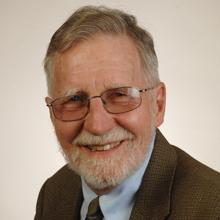Recent memorial ceremonies for Professor Peggy McCormack brought home to us that mortality can be all too swift and unexpected. We can enumerate achievements, but how can these sum up the colleague we loved? As another speaker pointed out, all the more important that we should voice our appreciation to the living. Yet I focus here on the departed.
From my perspective of 44 years and counting – somewhat less than half the life of the university so far – I name only members from my own department who have died, retired or moved on to other work.
Dawson Gaillard is memorialized by the department’s five annual writing contests named in her honor. Unfortunately, Dawson was cut off early in her career by M.S.
The annual Outstanding English Major award is rightly named for our past medievalist, Julian Wasserman, beloved by all. Those who knew Julian would give their blood for him and did.
Anthony Lala epitomized for me Loyola, New Orleans, and indeed the best of the South. Catholic born and bred, all of Shakespeare was an open book to Tony, but opera was his passion. When he began collecting recordings, a single act of a Wagner opera on shellac 78s was an armful. He taught until he was 80. Not long enough.
Some eminent writers have taught at and then left Loyola in my time, such as Miller Williams and John William Corrington, founders in the late 1960s of The New Orleans Review. Bill Corrington was a prolific poet and fiction writer, and in his post-Loyola career, collaborating with his wife Joyce, gained national recognition for five film scripts (including one of the Planet of the Apes sequels), as well as the Dallas-inspired TV series, “Texas.” And, although he taught only two classes in two different years, Walker Percy, who chronicled the New South of post-World War II America, should be included.
Not everyone who “departed” has died. My own “class” of retirees includes Bruce Henricksen, Richard Johnson, Ron Foust, Marcus Smith and Phanuel Egejuru. Bruce left teaching after a bout with throat cancer to write fiction and also to publish the work of others through his Lost Hills Books, thus becoming the kind of creator he wrote about in some of his five books of criticism. Although the Rev. Joseph Tetlow, S.J., thought up the Common Curriculum, it fell to Dick Johnson to win the N.E.H. grant that funded it and to guide it through its formative years. Post-retirement he has had an entire second career as an artist (a la William Blake), depicting the New Orleans scene in portraits. One of his major works hangs in the English department’s seminar room.
Ron Foust was our guide into the worlds of science fiction, fantasy, and . . . Poe. Marcus Smith always had the most international outlook of anyone in the department, having taught in Beirut and in Pakistan. The one of us who has an international reputation as novelist, biographer and storyteller, Phanuel Egejuru, has joined me in part-time teaching as an emeritus adjunct professor.
Some have left because they lovingly put the interests of their families, or of some larger community, before loyalty to our institution. We respect their choices but regret our loss of them: Kevin Roddy, Brenda-Marie Osbey, Anne Frey, Katie Ford, Paulette Richards and Janelle Schwartz.
Others left reluctantly because of losing tenure struggles. Perhaps Loyola’s first declared feminist, Jo McManis (now Le Coeur) has enjoyed a long and distinguished career as writer and teacher.
Particularly regrettable to me is that the poet Ralph Adamo never received a tenure-track job with us, despite his years of fine teaching. When I first interviewed at Loyola, I met student John Biguenet at a party. I immediately said to myself, “If this is what the students at Loyola are like, that is where I want to teach!” John has become the dean of our creative writing staff and an eminent local author.
The youngest of us all to go was Peter Fersch, who died in his sleep within a year of marrying one of his students.
The litany is devolving into a list. There are more names, could I remember them. Maybe some readers will.
Members of the Class of 2012, after enjoying their graduation ceremony, will exit the hall through a gantlet of proud faculty congratulating them on their degrees. Unseen by the graduates, but perhaps present in a special way, will be those who have in one way or another departed Loyola, once again remembered here.
William T. Cotton is a professor emeritus for the English department. He can be reached at [email protected]


















